Youth Win Right to Sue Feds Over Climate Change
Air Date: Week of April 15, 2016
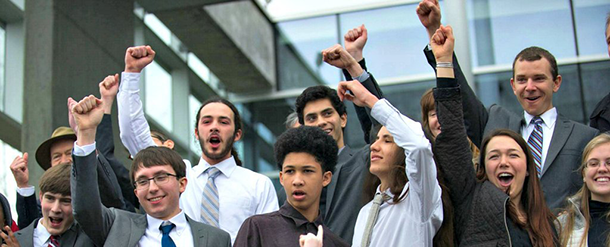
Victorious Children’s Trust plaintiffs after learning their climate suit can proceed (Photo: Our Children’s Trust)
A federal judge in Oregon has found that 21 young people have the right to sue the federal government for failing to properly protect future generations from the dangers of climate change. Vermont Law Professor Pat Parenteau tells host Steve Curwood it’s a surprising and perhaps landmark decision that shows climate change is a unique challenge for the legal system.
Transcript
[THEME]
CURWOOD: From the Jennifer and Ted Stanley studios at the University of Massachusetts Boston and PRI, this is Living on Earth. I’m Steve Curwood. A federal judge in Oregon has found that 21 young people have the right to sue the federal government for failing to properly protect future generations from the dangers of climate change. In making this landmark decision Magistrate Judge Thomas Coffin in part took his cue from a lower court in the Netherlands that found the Dutch Government must act on climate change because of its existential threat to its citizens. The case now goes to US District Judge Ann Aiken, who will determine if and when there would be trial. We turn now to Pat Parenteau, Law Professor at Vermont Law School, to explain this case. Welcome back to Living on Earth, Pat.
PARENTEAU: Thanks, Steve. Good to be with you.
CURWOOD: So I'm looking at this order from the judge in this case, all 24 pages of it. I've never seen anything like this. How surprised were you?
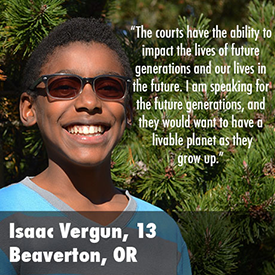
(Photo: Our Children’s Trust)
PARENTEAU: I was very surprised. This is a series of lawsuits that Our Children's Trust has filed across the country - some are federal courts, some in state courts - and in the past the children who are the named plaintiffs in the case have won some minor procedural victories but this one is more significant. This is the magistrate judge in Oregon whose decision then has to be referred to the actual federal judge in Oregon and it's Judge Aiken and she will have to actually decide whether to accept the recommendation of the magistrate judge, but Magistrate Judge Coffin has done something no other judge has been willing to do which is to recognize that the youthful plaintiffs have a potential constitutional claim that the United States government is falling down in its duty to protect the younger generation from the threats of climate change going forward.
CURWOOD: Let's tease apart upon some of the legalese here. Now when you say constitutional claim, what does that mean in plain language?
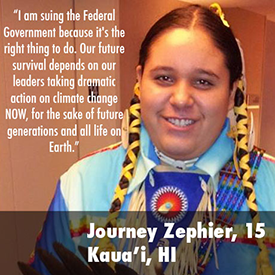
(Photo: Our Children’s Trust)
PARENTEAU: They're claiming a due process right based in the ninth amendment. This is the same amendment that has given rise to the right to privacy, to marriage equality, to a variety of individual rights not spelled out in the constitution, but contained within what's called the penumbra of the ninth amendment so that's what this judge is relying on. He's relying on case law from the Supreme Court that recognizes there are certain unwritten rights in the Constitution that come to light, if you will, as judges evaluate threats to American citizens, and in this case the judge is saying because the young population of the country will suffer the worst effects of climate change, they need to have their government respond by of course reducing the carbon pollution that is causing climate change now because they won't have the ability to do that in the future.
CURWOOD: Let's talk about the elements of Judge Coffin’s decision here. First he says that the kids have standing, and really a special standing because they're young folks. Can you explain that please?
PARENTEAU: The youth are saying they are harmed in ways that are different than, let's say the older population of America, which won't live long enough to see the worst consequences. So that's what makes this both a fascinating case and a really difficult case for the courts to deal with. The plaintiffs here, the children are saying, we're a special class when it comes to climate change because the only way for us to avoid the effects we're going to feel is if efforts are stepped up now to reduce carbon pollution.
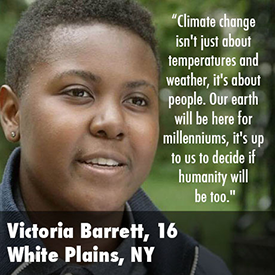
(Photo: Our Children’s Trust)
CURWOOD: What are the plaintiffs seeking to have the federal government do in this case?
PARENTEAU: They've asked for a very broad range of remedies. They've asked specifically that the government cancel contracts to export gas from an LNG, a liquefied natural gas terminal in Oregon. That's one of the most specific things they've asked for, but they've also asked that the government do an accounting for the greenhouse gas emissions that are occurring, and what is the government doing to reduce those emissions over what period of time. And they're actually asking that the court order the government to reduce the loading of carbon in the atmosphere down to the 350 parts per million level that's been recommended by several scientists including James Hansen, who is named as a guardian in this case for the children. So they're asking for an extraordinary relief never before ordered by a court telling the government to begin reducing carbon emissions and literally bring them down to a point where there is no longer at least a serious threat from climate change.
CURWOOD: And how is the government supposed to do this according to the plantiffs?
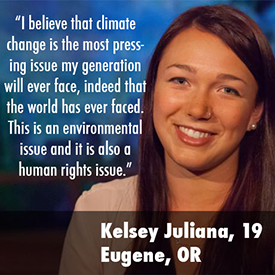
(Photo: Our Children’s Trust)
PARENTEAU: Well, they don't spell that out. They are basically asking for a plan, and the question, of course, is who would provide that plan - the President, the Congress, those are all questions. They're problematic questions, frankly. I think the courts are going to have a hard time ordering the United States government to take the steps that the plaintiffs are seeking and it may be that the real value of a case like this is to elevate this issue in the court of public opinion certainly with an election coming up, and try to get the elected politicians to respond to this. They're seeking a court order, but I have my doubts that a court is going to order the kind of relief they're asking for.
CURWOOD: And what's the major reason you think that this will fail ultimately?
PARENTEAU: In the courts I think the separation of powers between the executive branch, the legislative branch and the judicial branch is a real barrier to a case like this. It's not a traditional function for our courts to be ordering this kind of broad scale economic energy policy that's really economywide. And it's also the case that even if the United States of course were to do everything it could to reduce its carbon pollution...unless the other major emitters in the world do likewise it won't accomplish the purpose. That's another reason why I think courts are going to be reluctant to be imposing duties on the executive and legislative branches of government where this is a global problem that requires a global solution.
CURWOOD: What about the question of a constitutional right to be free from CO2 emissions that’s in this case?
PARENTEAU: Well, you know, there have been courts that have recognized the right of bodily integrity, which means that you have a right to be free of contaminants or threats to your health that would emanate from activities that were either permitted by the government or perhaps not permitted and should be permitted. And it's in that vein, I think, that this judge is referring to the threats of climate change as being not only a threat to the bodily integrity of these young plaintiffs, but even more fundamentally that this is threatening the very viability of ecosystems to provide food and shelter and so forth for citizens. In that sense it's at the outer edges certainly of constitutional theory, but the idea that American citizens should be protected from an existential threat like climate change is not really that far-fetched. It is after all the fundamental duty of government to protect the citizens from existential threats and that's exactly what climate change represents.
CURWOOD: So what happens here going forward, do you think? What will happen next?
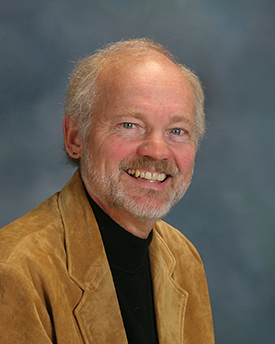
Former EPA Regional Counsel Pat Parenteau teaches environmental law at Vermont Law School (Photo: courtesy of Vermont Law School)
PARENTEAU: Well I think that Judge Aiken has a big decision to make as to whether to accept the recommendation of the magistrate judge or whether to hold further hearings in argument or maybe accept a part of what Magistrate Coffin has said and not all of it. So that's the next step. Assuming that Judge Aiken accepts those recommendations, then the next step will be will the government file a motion for summary judgment in which they can argue, “you no longer should accept what the plaintiffs are saying as true. We're going to introduce affidavits to counter what the plaintiffs are saying.” For example, they're going to say “the government is taking lots of steps to address climate change. It's not true that we're just sitting on our hands, certainly not true of the president.” So we'll have another round of argument, I think, and maybe the case will get resolved on summary judgment and maybe not. If it goes to trial, it will be the trial of the century. It'll outdo the Scopes trial because you’re going to have all kinds of climate scientists coming in saying how grave the threat is, how little time we have to address it, and that would be a very interesting spectacle, frankly.
CURWOOD: Pat Parenteau is a professor from Vermont Law School. Thanks for joining us today.
PARENTEAU: You're welcome, Steve.
Links
Press Release from Our Children’s Trust
Living on Earth wants to hear from you!
Living on Earth
62 Calef Highway, Suite 212
Lee, NH 03861
Telephone: 617-287-4121
E-mail: comments@loe.org
Newsletter [Click here]
Donate to Living on Earth!
Living on Earth is an independent media program and relies entirely on contributions from listeners and institutions supporting public service. Please donate now to preserve an independent environmental voice.
NewsletterLiving on Earth offers a weekly delivery of the show's rundown to your mailbox. Sign up for our newsletter today!
 Sailors For The Sea: Be the change you want to sea.
Sailors For The Sea: Be the change you want to sea.
 The Grantham Foundation for the Protection of the Environment: Committed to protecting and improving the health of the global environment.
The Grantham Foundation for the Protection of the Environment: Committed to protecting and improving the health of the global environment.
 Contribute to Living on Earth and receive, as our gift to you, an archival print of one of Mark Seth Lender's extraordinary wildlife photographs. Follow the link to see Mark's current collection of photographs.
Contribute to Living on Earth and receive, as our gift to you, an archival print of one of Mark Seth Lender's extraordinary wildlife photographs. Follow the link to see Mark's current collection of photographs.
 Buy a signed copy of Mark Seth Lender's book Smeagull the Seagull & support Living on Earth
Buy a signed copy of Mark Seth Lender's book Smeagull the Seagull & support Living on Earth

